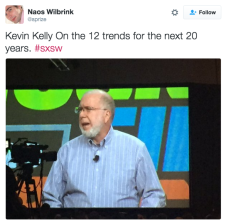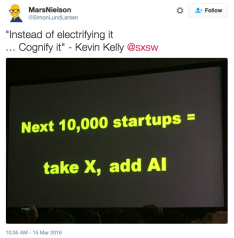Inevitable tech forces that will shape the future as told by the smartest man I’ve ever heard speak
 In this guest post Dan Monheit looks at the three top trends coming through technology, as told by Wired magazine’s founder.
In this guest post Dan Monheit looks at the three top trends coming through technology, as told by Wired magazine’s founder.
Lines are nothing new at SXSW, even the men’s toilets have them. It’s the unofficial festival of queuing.
But when you find yourself standing in one that snakes around an entire floor of the convention centre and then makes its way downstairs you get the feeling you’re in for something special.
 And that something special was an hour receiving wisdom from Kevin Kelly, founding executive editor of Wired magazine. For those unfamiliar, Wired is the tech world’s undisputed king of pretty much everything, credited for, amongst other things, coining terms like ‘Long Tail’ (2004) and ‘crowdsourcing’ (2006), long before they become the fodder of every agency strat deck.
And that something special was an hour receiving wisdom from Kevin Kelly, founding executive editor of Wired magazine. For those unfamiliar, Wired is the tech world’s undisputed king of pretty much everything, credited for, amongst other things, coining terms like ‘Long Tail’ (2004) and ‘crowdsourcing’ (2006), long before they become the fodder of every agency strat deck.
When Kelly decides to talk, people turn up to listen, even if they’ve spent the last three days hearing from industry giants including Pete Cashmore (Mashable founder), Adam Silver (Commissioner of the NBA), Kevin Plank (founder and CEO of Under Armour) and some guy called Barak Obama.
In 60 minutes, Kelly took us through three of the 12 tech forces outlined in his upcoming book, The Inevitable. Each force builds on momentum that’s already well underway, making his predictions seem both profound and completely undeniable.
I’ve never felt so smart and so stupid at the same time. From his mouth to my frantic notes to you, here’s a little of what we can expect over the next 20 years.
1. Cognified everything
Cognified everything is Kelly’s more approachable term for Artificial Intelligence (AI). We’ve been chipping away at this for almost 25 years and are finally starting to see the fruits of our labour with things like autopilot, Siri and in car safety systems.
Things are accelerating exponentially due to advances in neural nets (powerful software able to imitate and replicate the complexity of our brains), GPUs (computer chips popularised in the gaming industry that can run processes simultaneously rather than sequentially) and Big Data (lots of it, everywhere).
As a result of these three factors, we’re starting to create machines that are not just capable of completing a task, but actually learning how to complete a task by observation, trial and error. Google have developed machines that can learn to play a video game to such a high level, just by watching it being played, that they can then beat most human competitors.
Kelly predicts that artificial intelligence will be produced in bulk, data crunching super centers, far away from where we live and work. And then, much like electricity, water and web hosting services, be piped in on demand, when and where we need it.
 Rather than all of this AI manifesting as the traditional ‘attempting to be human’ robots we all imagine, we will develop thousands and thousands of small, very specific types of intelligence that we can apply when different sorts of thinking is required – just like we’ve traditionally done with calculators (only good for maths) and chess simulators (only good for playing chess).
Rather than all of this AI manifesting as the traditional ‘attempting to be human’ robots we all imagine, we will develop thousands and thousands of small, very specific types of intelligence that we can apply when different sorts of thinking is required – just like we’ve traditionally done with calculators (only good for maths) and chess simulators (only good for playing chess).
In fact, Kelly suggests that the next thousand startup ideas will take the ‘X + electricity’ formula that gave rise to most of yesterday’s innovations, and replace it with ‘X + AI’ – especially when AI is something we can get on tap.
Yes, the robots will take all of our jobs, or at least those jobs which are focused on productivity. In fact, in the not too distant future, we’ll be ashamed that we ever did them. Instead, we’ll be focused on all of the wonderful pursuits in which productivity is not important, like science, creativity, innovation, craft, experiences and relationships.
2. Virtuality
Kelly is betting big on virtuality, which comprises both VR (virtual reality) and MR (mixed, or augmented reality), declaring it the next platform after smartphones.
Virtual Reality today is a bit better than it was 20 years ago, but more importantly, it’s about a thousand times cheaper. Mobile phones have made this happen by bringing three important components down to commodity pricing, namely; screens, accelerometers and processors, making rapid adoption merely a matter of time.
As things evolve, we’ll move beyond the basics of Swivel VR (moving our heads side to side, up and down) to roaming VR, in which we walk around, pick up and put down objects in a 3D space. Tracking and fooling our whole body is exponentially harder than making 3D pictures for us to look at, but we’re already well on the way, incorporating things like tactility, smell and temperature to the mix.
Techniques like redirected walking will also change the game, allowing us to walk in small circles while feeling like we’re walking in a straight line (seriously, Google it).
Once mainstream, VR will be the most social platform of all.
3. Tracking
![]() If it doesn’t happen in real time, it won’t count. Same goes for personalisation, and both of these will require us to dial up our level of tracking like never before. According to Kelly, everything that can be tracked, will be tracked, and everything that can be measured will be measured.
If it doesn’t happen in real time, it won’t count. Same goes for personalisation, and both of these will require us to dial up our level of tracking like never before. According to Kelly, everything that can be tracked, will be tracked, and everything that can be measured will be measured.
When in place, this will result in things like personalised medicine that reformulates itself daily based on what we did the day before.
Today, tracking feels scary because of the asymmetry of information. ‘They know lots about me, but I know nothing about them’.
To make tracking more palatable, more civil, we’ll move to co-veillance, a system where we can see what’s tracked, make corrections where required and directly benefit from the information gathered about us. We’ll be able to control the slider on the continuum between ‘private and generic’ and ‘transparent and personalised’.
Early indicators suggest that despite our vocalised fears about privacy, vanity trumps it nine times out of ten.
In closing, Kelly begged us to not be scared of scary sounding technology, and instead to run towards it with open arms. He reminded us that the greatest inventions of the next 20 year period have not yet been invented, and that we’d better get busy inventing them.
Dan Monheit is co-founder of Hardhat Digital





“Early indicators suggest that despite our vocalised fears about privacy, vanity trumps it nine times out of ten.”
Not just vanity. Convenience & experience too. If tracking me means I am served a better experience, or can better get the things I want when I want them then I don’t really have too much of an issue with it.
User ID not verified.